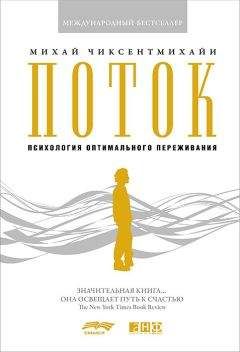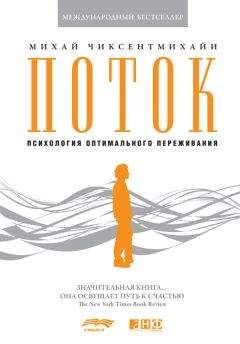Эдварда Лауманна, Вэйн Бут, Марту Макклинток и моих коллег из Комитета по развитию человеческого потенциала, чьи знания и дружба все эти годы очень много для меня значили.
Из моих многочисленных нынешних и прежних студентов, внесших свой вклад в создание этой книги, я хочу отметить Кевина Ратунде, сейчас преподающего в университете Юты, Марию Вонг из Уэслианского университета (штат Коннектикут) и Самюэля Уэйлена. Отдельно я хочу поблагодарить Фонд Спенсера, который в течение ряда лет щедро спонсирует мои исследования. Я также хочу выразить признательность Джону Брокману, без которого этот проект не смог бы осуществиться, и Рика Кота, чье редакторское мастерство значительно улучшило эту книгу. Наконец, я хочу сказать спасибо сотням читателей «Потока», рассказавшим мне о том, что им нравится или не нравится в моей книге. Их отзывы убедили меня в необходимости сделать следующий шаг.
Чикаго, июнь 1993 года
Adams, Н. [1905] 1959. Mont Saint-Michel and Chartres. Garden City, N. Y.: Doubleday Anchor.
Aeschbacher, U. 1992. Der Krieger — oder: Das unheimliche Liebaugeln mit der Faschismus. Intra, Psychologic und Gesellschaft 15:42–45.
Alain [Emile Chartier, pseud.]. 1989. Alain on Happiness. Evanston, 111.: Northwestern University Press. Alexander, R. D. 1985. A biological interpretation of moral systems. Zygon: Journal of Religion and Science 20:3-20.. 1987. Tlie biology of moral systems. New York: Aldine de Guyter.
Allison, М. Т., and М. C. Duncan. 1988. Women, work, and flow. In Optimal experience: Psychological studies of flow in consciousness, ed. M. Csikszentmihalyi and I. S. Csikszentmihalyi, 118-37. New York: Cambridge University Press.
Amabile, Т. M. 1983. Tlic social psychology of creativity. New York: Springer-Verlag.
American Humane Assoc. 1987. Highlights of Official Aggregate Child Neglect and Abuse Reporting. Washington, D. C.
Anderson, A. R., ed. 1964. Minds and machines. Englewood Cliffs, N. J.: Prentice-Hall.
Anderson, M. 1986. Varieties of animal companionship. Central Issues in Anthropology 6 (no. 2): 1-11.
Andreasen, N. С. 1987. Creativity and mental illness: Prevalence rates in writers and their first-degree relatives. American Journal of Psychiatry 144 (no. 10): 1288-92.
Antonovsky, A. 1979. Health, stress, and coping. San Francisco: Jossey Bass.
Apter, M. J. 1992. The dangerous edge: The psychology of excitement. New York: The Free Press.
Arendt, H. 1956. Tlie human condition. Chicago: University of Chicago Press.
Argyle, M. 1987. Tlie psychology of happiness. London: Methuen. Aries, P., and G. Duby, eds. 1987. A history of private life. Cambridge, Mass.: Belknap Press.
Asimov, I., and F. Walker. 1990. The march of the millennia. New York: Walker.
Bandura, A. 1977. Self-efficacy: Toward a unifying theory of behavioral change. Psychological Review 84:191–215.
Bateson, G. 1972. Steps to an ecology of the mind. New York: Ballantine.
Bee, H. L. 1992. The journey of adulthood. New York: Macmillan.
Bellah, R. N., R. Madsen, W.M. Sullivan, A. Swidler, and S. M. Tipton. 1991. The good society. New York: Alfred Knopf. Benedict, R. 1934. Patterns of culture. Boston: Houghton-Mifflin.
Berger, P. L., and T. Luckmann. 1967. The social construction of reality. Garden City, N. Y.: Anchor Books.
Berlyne, D. E. 1960. Conflict, arousal, and curiosity. New York: McGraw Hill.
Bexton, W. H., W. Heron, T. H. Scott. 1954. Effects of decreased variation in the sensory environment. Canadian Journal of Psychology 8:70–76.
Bloch, M. 1967. Land and work in medieval Europe. Berkeley: University of California Press.
Bloom, A. 1987. The closing of the American mind. New York: Simon & Schuster.
Bly, R. 1990. Iron John. New York: Addison-Wesley.
Boyer, L. В. 1955. Christmas neurosis. Journal of the American Psychoanalytic Association 3:467-88.
Bradburn, N. 1969. The structure of psychological well-being. Chicago: Al-dine.
Brannigan, A. 1981. The social basis of scientific discoveries. New York: Cambridge University Press.
Braudel, F. 1985. The structures of everyday life. Vol. 1. New York: Harper & Row.
Britannica Book of the Year. 1993. Chicago: The Encyclopaedia Britannica Press, 546–755.
Brown, N. 0.1959. Life against death. Middletown, Conn.: Wesleyan University Press.
Bruner, J. S., A. Jolly, and K. Sylva. 1976. Play — Its role in development and evolution. New York: Basic Books.
Burgess, E. W., ed. 1926. The urban community. Chicago: University of Chicago Press.
Burhoe, R. W. 1982. Pleasure and reason as adaptations to nature’s requirements. Zygon 17 (no. 2): 113-31.
Cabanac, M. 1971. Physiological role of pleasure. Science 173:1103-7.
Caligari, P., and F. Massimini. 1976. Introduzione alia tepria del valori umani. Milan: Institute Editoriale Intemazionale.
Carlyle, T. 1838. Critical and Miscellaneous Essays: Sir Walter Scott. Edinburgh.
Campbell, A. P., P.E. Converse, and W.L. Rodgers. 1976. The quality of American life. New York: Russell Sage.
Campbell, D. T. 1975. On the conflicts between biological and social evolution and between psychology and moral tradition. American Psy — chologist 30:1103-26.
—. 1976. Evolutionary epistemology. In The library of living philoso — phers, ed. D.A. Schlipp, 413-63. LaSalle, 111.: Open Court.
Carruth, G. 1987. What happened when: A chronology of life and events in America. New York: Harper & Row.
Castaneda, С. 1971. A separate reality. New York: Simon & Schuster. Cattell. J. P. 1955. The holiday syndrome. Psychoanalytic Review 42:39–43.
Chandrasekhar, S. 1987. Truth and beauty: Aesthetics and motivations in science. Chicago: University of Chicago Press.
Cohn, N. 1957. The pursuit of millennium. London. Colby, A., and W. Damon. 1992. Some do care. New York: The Free Press.
Coleman, J. 1990. Foundations of social theory. Cambridge, Mass.: Belknap Press.
Cook, K. S., and M. Levi. 1990. The limits of rationality. Chicago: University of Chicago Press.
Coppinger, R., and C. S. Smith. 1983. The domestication of evolution. Environmental Conservation 10 (no. 4): 283-92.
Coser, L. A. 1951. Some aspects of Soviet family policy. The American Journal of Sociology 54 (no. 5): 424-54.
Creel, H. G. 1960. Confucius and the Chinese way. New York: Harper Torchbooks.
Cressey, P. G. 1932. The taxi-dance hall: A sociological study in commercialized recreation and city life. Chicago: University of Chicago Press.
Csikszentmihalyi, I. 1986. II flusso di coscienza in un contesto storico: II caso dei gesuiti. In Vesperienza quotidiana, ed. F. Mas-simini and P. Inghilleri, 181-96. Milan: Franco Angeli. 1988. Flow in a historical context: The case of the Jesuits. In Optimal experience: Psychological studies of flow in consciousness, ed. M. Csikszentmihalyi and I. S. Csikszentmihalyi, 232-48. New York: Cambridge University Press.
Csikszentmihalyi, M. 1967. Marx: A socio-psychological evaluation. Modem Age 11 (no. 3): 273-82.
—. 1973. Socio-cultural speciation and human aggression. Zy-gon 8 (no. 2): 96-112.
—. 1975.Beyond boredom and anxiety. San Francisco: Jossey-Bass.
—. 1978. Attention and the wholistic approach to behavior. In The stream of consciousness, ed. K. S. Pope and J. L. Singer, 335-58. New York: Plenum.
—. 1981. Leisure and socialization. Social Forces 60: 332-40.
—. 1985. Reflections on enjoyment, erspectives in Biology and Medicine 28 (no. 4): 469-97.
—. 1988a. Society, culture, and person: A systems view of creativity. In The nature of creativity: Contemporary psychological perspectives, ed. R.J. Sternberg, 325-39. New York: Cambridge University Press.
—. 1988b. Motivation and creativity: Towards a synthesis of struc— tural and energistic approaches to cognition. New Ideas in Psychology 6 (no. 2): 159-76.
—. 1988c. Solving a problem is not finding a new one: A response to Herbert Simon. New Ideas in Psychology 6 (no. 2): 183-86.
—. 1990a. Flow: The psychology of optimal experience. New York: Harper & Row.
—. 1990b. Literacy and intrinsic motivation. Daedalus 119 (no. 2): 115-40.
—. 1990c. The domain of creativity. In Theories of creativity, ed. R. Albert and M. Runco, 190–214. Newbury Park, Calif: Russel Sage.
—. 1991. Consciousness for the twenty-first century. Zygon 26 (no. 1): 7-25.
—. 1992. Imagining the self: An evolutionary excursion. Poetics 21:153-67.
—. 1993a. Contexts of optimal growth in childhood. Daedalus 122 (no. 1): 31–56.
—. 1993b. Why we need things. In History from things: Essays on material culture, ed. S. Lubar and W.D. Kingery, 20–29. Washington, D. C.: Smithsonian Press.
Csikszentmihalyi, М., and I. S. Csikszentmihalyi, eds. 1988. Optimal experience: Studies of flow in consciousness. New York: Cambridge University Press.
—. 1993. Family influences on the development of talent. Ciba Foundation symposium on The Origins and Development of High Ability. London, U. K.
Csikszentmihalyi, М., and Т. Figurski. 1982. The experience of self-awareness in everyday life. Journal of Personality 50 (no. 1): 14–26.
Csikszentmihalyi, М., and R. Larson. 1978. Intrinsic rewards in schoolcrime. Crime and Delinquency 24: 322-35.
—. (1984). Being adolescent: Conflict and growth in the teenage years. New York: Basic Books.
Csikszentmihalyi, М., R. Larson, and S. Prescott. 1977. The ecology of adolescent activities and experiences. Journal of Youth and Adolescence 6: 281-94.
Csikszentmihalyi, М., and J. LeFevre. 1989. Optimal experience in work and leisure. Journal of Personality and Social Psychology 56 (no.5): 815-22.
Csikszentmihalyi, М., and F. Massimini. 1985. On the psychological selection of bio-cultural information. New Ideas in Psychology 3(no.2): 115-38.
Csikszentmihalyi, М., and K. Rathunde. 1990. The psychology of wisdom: An evolutionary interpretation. In Wisdom: Its nature, origins, and development, ed. R.J. Sternberg, 25–51. New York: Cambridge University Press.
Csikszentmihalyi, М., К. Rathunde, and S. Whalen. 1993. Talented teenagers: A longitudinal study of their development. New York: Cambridge University Press.
Csikszentmihalyi, М., and R. Robinson. 1990. The art of seeing. Malibu, Calif.: J. P. Getty Press.
Csikszentmihalyi, М., and E. Rochberg-Halton. 1981. The meaning of things: Domestic symbols and the self. New York: Cambridge University Press.
Csikszentmihalyi, М., and U. Schiefele. 1992. Arts education, human development, and the quality of experience. In Arts in Education: The 91st yearbook of the Society for the Study of Education, ed. G. Reimer and R. A. Smith, 169-91. Chicago: University of Chicago Press.
Damon, W. 1983. Social and personality development. New York: W.W. Norton.
Davis, F. D., R. P. Bagozzi, and P. R. Warshaw. 1989. Usefulness versus fun as determinants of intentions to use computers in the workplace. Working paper. Ann Arbor, Mich.: University of Michigan Press.
Dawkins, R. 1976. The selfish gene. Oxford: Oxford University Press.
—. 1982. The extended phenotype. Oxford: Oxford University Press.
deCharms, R. 1968. Personal causation: The internal affective determinants of behavior. New York: Academic Press.
Deci, E. L., and R. M. Ryan. 1985. Intrinsic motivation and self-determination in human behavior. New York: Plenum Press.
Delle Fave, A., and F. Massimini. 1988. Modernization and the changing contexts of flow in work and leisure. In Optimal experience: Studies of flow in consciousness, ed. M. Csikszentmihalyi and I. S. Csikszentmihalyi, 193–213. New York: N Cambridge University Press.
—. 1992. The ESM and the measurement of clinical change: A case of anxiety disorder. In The experience of psychopathology, ed. M. deVries, 280-89, Cambridge: Cambridge University Press.
Dennett, D. C. 1991. Consciousness explained. Boston: Little, Brown.
deVries, М., ed. 1992. The experience of psychopathology: Investigating mental disorders in their natural settings. Cambridge: Cambridge University Press.
Dewey, J. 1913. Interest and effort in education. Cambridge: The Riverside Press.
Diamond, J. 1992. The third chimpanzee. New York: HarperCol-lins. Didion, J. 1989. Letter from Los Angeles. The New Yorker (24 April): 88–99.





